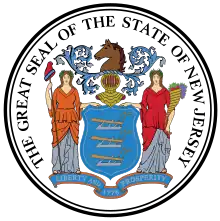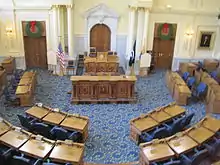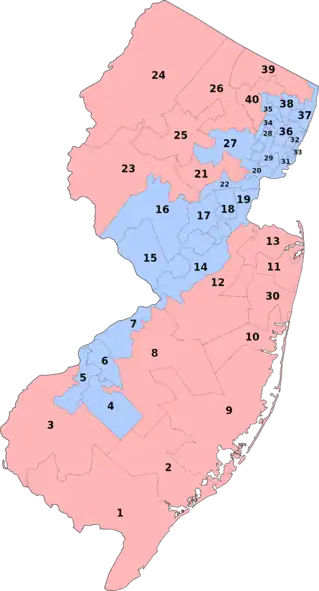New Jersey General Assembly
The New Jersey General Assembly is the lower house of the New Jersey Legislature.
New Jersey General Assembly | |
|---|---|
| New Jersey State Legislature | |
 | |
| Type | |
| Type | |
Term limits | None |
| History | |
New session started | January 11, 2022 |
| Leadership | |
Speaker | |
Speaker pro tempore | |
Majority Leader | |
Minority Leader | |
| Structure | |
| Seats | 80 |
 | |
Political groups | Majority
Minority
|
Length of term | 2 years |
| Authority | Article IV, New Jersey Constitution |
| Salary | $49,000/year |
| Elections | |
| Plurality-at-large voting | |
Last election | November 2, 2021 (80 seats) |
Next election | November 5, 2023 (80 seats) |
| Redistricting | New Jersey Apportionment Commission |
| Meeting place | |
 | |
| General Assembly Chamber New Jersey State House Trenton, New Jersey | |
| Website | |
| www | |
Since the election of 1967 (1968 session), the Assembly has consisted of 80 members. Two members are elected from each of New Jersey's 40 legislative districts for a term of two years, each representing districts with average populations of 232,225 (2020 figures), with deviation in each district not exceeding 3.21% above and below that average.[1] To be eligible to run, a potential candidate must be at least 21 years of age, and must have lived in their district for at least one year prior to the election, and have lived in the state of New Jersey for two years. They also must be residents of their districts. Membership in the Assembly is considered a part-time job, and many members have employment in addition to their legislative work. Assembly members serve two-year terms, elected every odd-numbered year in November. One current member of the Assembly holds another elective office, as he is grandfathered in under a New Jersey law that banned multiple office holding in 2007.
The Assembly is led by the Speaker of the Assembly, who is elected by the membership of the chamber. After the Lieutenant Governor of New Jersey and the President of the New Jersey Senate, the Speaker of the Assembly is third in the line of succession to replace the Governor of New Jersey in the event that the governor is unable to execute the duties of that office. The Speaker decides the schedule for the Assembly, which bills will be considered, appoints committee chairmen, and generally runs the Assembly's agenda. The current Speaker is Craig Coughlin (D-Woodbridge).
Salary and costs
Members of the NJ General Assembly receive an annual base salary of $49,000 with the Senate President and the Assembly Speaker earning slightly more.[2][3] Members receive $110,000 for staff salaries. In addition, they receive 12,500 postage stamps, stationery and a telephone card. They receive New Jersey State health insurance and other benefits. The total cost to the State of New Jersey for each member of the general assembly is approximately $200,000 annually.[4]
"Double dipping"
Under state law that remained in effect until 2008, New Jersey Assembly, as well as Senate, members were allowed to serve in both one chamber or the other, as well as any other government positions they might have held at the time, although those who were still doing so as of 2008 ended up getting "grandfathered":
- Name, Party-County – Second Public Office (name in bold represents state Assembly member still in both local and state offices as of 2023):
Assembly members:
- John Burzichelli, D-Gloucester – Mayor, Paulsboro
- Ralph Caputo, D-Essex – Freeholder, Essex County
- Anthony Chiappone, D-Hudson – Councilman, Bayonne
- Ronald Dancer, R-Ocean – Mayor, Plumsted Township
- Joseph Egan, D-Middlesex – Councilman, New Brunswick
- Elease Evans, D-Passaic – Freeholder, Passaic County
- John McKeon, D-Essex – Mayor, West Orange
- Paul D. Moriarty, D-Gloucester – Mayor, Washington Township
- Ruben Ramos, D-Hudson – Councilman, Hoboken
- Scott Rumana, R-Bergen – Mayor, Wayne
- Gary Schaer, D-Passaic – Councilman, Passaic
- Daniel Van Pelt, R-Ocean – Mayor, Ocean Township
- Joseph Vas, D-Middlesex – Mayor, Perth Amboy
History
Committees and committee chairs
Committee chairs for the 2022-2023 Legislative Session are:[5]
- Aging & Senior Services - Asw. Angela V. McKnight (D-Jersey City)
- Agriculture and Food Security - Asm. Roy Freiman (D-Hillsborough)
- Appropriations - Asw. Lisa Swain (D-Fair Lawn)
- Budget - Asw. Eliana Pintor Marin (D-Newark)
- Commerce and Economic Development - Asw. Britnee Timberlake (D-East Orange)
- Community Development & Affairs - Asw. Shavonda E. Sumter (D-Paterson)
- Consumer Affairs - Asm. Paul D. Moriarty (D-Washington Township, Gloucester County)
- Education - Asw. Pamela R. Lampitt (D-Cherry Hill)
- Environment and Solid Waste - Asm. James J. Kennedy (D-Rahway)
- Financial Institutions and Insurance - Asm. John F. McKeon (D-Montclair)
- Health and Senior Services - Asm. Herb Conaway, MD (D-Moorestown)
- Higher Education - Asw. Mila Jasey (D-South Orange)
- Homeland Security and State Preparedness - Asw. Shanique Speight (D-Newark)
- Housing - Asw. Yvonne Lopez (D-Perth Amboy)
- Human Services - Asw. Angelica Jimenez (D-West New York)
- Judiciary - Asm. Raj Mukherji (D-Jersey City)
- Labor - Asm. Joseph Egan (D-New Brunswick)
- Law and Public Safety - Asm. William Spearman (D-Camden City)
- Military and Veterans' Affairs - Asw. Cleopatra Tucker (D-Newark)
- Oversight, Reform and Federal Relations - Asm. Joseph Danielsen (D-Franklin Township, Somerset County)
- Regulated Professions - Asm. Thomas Giblin (D-Montclair)
- Science, Innovation and Technology - Asm. Christopher Tully (D-Bergenfield)
- Special Committee on Infrastructure and Natural Resources - Asm. Robert J. Karabinchak (D-Edison)
- State and Local Government - Asm. Anthony S. Verrelli (D-Hopewell Township)
- Telecommunications and Utilities - Asm. Wayne DeAngelo (D-Hamilton Township, Mercer County)
- Tourism, Gaming and the Arts - Asm. Ralph Caputo (D-Nutley)
- Transportation and Independent Authorities - Asm. Daniel R. Benson (D-Hamilton Township, Mercer County)
- Women and Children - Asw. Gabriela Mosquera (D-Blackwood (Gloucester Township), Camden County)
Composition
| Affiliation | Party (Shading indicates majority caucus) |
Total | ||
|---|---|---|---|---|
| Democratic | Republican | Vacant | ||
| 2018–2019 | 54 | 26 | 80 | 0 |
| 2020–2021 | 52 | 28 | 80 | 0 |
| 2022–2023 | 46 | 34 | 80 | 0 |
| Latest voting share | 58% | 43% | ||

| Legislative District | Assembly Member | Party | Assumed Office | |
|---|---|---|---|---|
| District 1 | Erik Simonsen | Rep | January 14, 2020 | |
| Antwan McClellan | Rep | January 14, 2020 | ||
| District 2 | Claire Swift | Rep | January 11, 2022 | |
| Don Guardian | Rep | January 11, 2022 | ||
| District 3 | Beth Sawyer | Rep | January 11, 2022 | |
| Bethanne McCarthy-Patrick | Rep | January 11, 2022 | ||
| District 4 | Paul D. Moriarty | Dem | January 10, 2006 | |
| Gabriela Mosquera | Dem | March 5, 2012 | ||
| District 5 | William Spearman | Dem | June 30, 2018 | |
| Bill Moen | Dem | January 14, 2020 | ||
| District 6 | Louis Greenwald | Dem | January 10, 2012 | |
| Pamela Rosen Lampitt | Dem | January 10, 2006 | ||
| District 7 | Herb Conaway | Dem | January 13, 1998 | |
| Carol A. Murphy | Dem | January 9, 2018 | ||
| District 8 | Michael Torrissi | Rep | January 11, 2022 | |
| Brandon Umba | Rep | January 11, 2022 | ||
| District 9 | Brian E. Rumpf | Rep | June 23, 2003 | |
| DiAnne Gove | Rep | December 7, 2009 | ||
| District 10 | Gregory P. McGuckin | Rep | January 10, 2012 | |
| John Catalano | Rep | January 14, 2020 | ||
| District 11 | Marilyn Piperno | Rep | January 11, 2022 | |
| Kim Eulner | Rep | January 11, 2022 | ||
| District 12 | Alex Sauickie | Rep | July 23, 2022 | |
| Robert D. Clifton | Rep | January 10, 2012 | ||
| District 13 | Vicky Flynn | Rep | January 11, 2022 | |
| Gerard Scharfenberger | Rep | January 14, 2020 | ||
| District 14 | Wayne DeAngelo | Dem | January 8, 2008 | |
| Daniel R. Benson | Dem | January 11, 2011 | ||
| District 15 | Verlina Reynolds-Jackson | Dem | February 15, 2018 | |
| Anthony Verrelli | Dem | August 5, 2018 | ||
| District 16 | Sadaf Jaffer | Dem | January 11, 2022 | |
| Roy Freiman | Dem | January 9, 2018 | ||
| District 17 | Joseph Danielsen | Dem | October 16, 2014 | |
| Joseph V. Egan | Dem | January 8, 2002 | ||
| District 18 | Sterley Stanley | Dem | January 27, 2021 | |
| Robert Karabinchak | Dem | May 26, 2016 | ||
| District 19 | Craig Coughlin | Dem | January 12, 2010 | |
| Yvonne Lopez | Dem | January 9, 2018 | ||
| District 20 | Annette Quijano | Dem | September 25, 2008 | |
| Reginald Atkins | Dem | January 11, 2022 | ||
| District 21 | Michele Matsikoudis | Rep | January 11, 2022 | |
| Nancy Munoz | Rep | May 21, 2009 | ||
| District 22 | James J. Kennedy | Dem | January 12, 2016 | |
| Linda S. Carter | Dem | May 24, 2018 | ||
| District 23 | Erik Peterson | Rep | December 7, 2009 | |
| John DiMaio | Rep | February 21, 2009 | ||
| District 24 | Parker Space | Rep | March 21, 2013 | |
| Hal Wirths | Rep | January 9, 2018 | ||
| District 25 | Aura Dunn | Rep | November 21, 2019 | |
| Brian Bergen | Rep | January 14, 2020 | ||
| District 26 | Christian Barranco | Rep | January 11, 2022 | |
| Jay Webber | Rep | January 8, 2008 | ||
| District 27 | John F. McKeon | Dem | January 8, 2002 | |
| Mila Jasey | Dem | November 8, 2007 | ||
| District 28 | Cleopatra Tucker | Dem | January 8, 2008 | |
| Jackie Yustein | Dem | May 25, 2023 | ||
| District 29 | Eliana Pintor Marin | Dem | September 11, 2013 | |
| Shanique Speight | Dem | January 9, 2018 | ||
| District 30 | Sean T. Kean | Rep | January 10, 2012 | |
| Ned Thomson | Rep | August 24, 2017 | ||
| District 31 | Angela V. McKnight | Dem | January 12, 2016 | |
| William Sampson | Dem | January 11, 2022 | ||
| District 32 | Angelica M. Jimenez | Dem | January 10, 2012 | |
| Pedro Mejia | Dem | April 12, 2018 | ||
| District 33 | Raj Mukherji | Dem | January 14, 2014 | |
| Annette Chaparro | Dem | January 12, 2016 | ||
| District 34 | Thomas P. Giblin | Dem | January 10, 2006 | |
| Britnee Timberlake | Dem | January 29, 2018 | ||
| District 35 | Shavonda E. Sumter | Dem | January 10, 2012 | |
| Benjie E. Wimberly | Dem | January 10, 2012 | ||
| District 36 | Gary Schaer | Dem | January 10, 2006 | |
| Clinton Calabrese | Dem | February 10, 2018 | ||
| District 37 | Ellen Park | Dem | January 11, 2022 | |
| Shama Haider | Dem | January 11, 2022 | ||
| District 38 | Lisa Swain | Dem | May 24, 2018 | |
| Chris Tully | Dem | May 24, 2018 | ||
| District 39 | DeAnne DeFuccio | Rep | April 9, 2021 | |
| Robert Auth | Rep | January 14, 2014 | ||
| District 40 | Kevin J. Rooney | Rep | December 12, 2016 | |
| Christopher DePhillips | Rep | January 9, 2018 | ||
List of past Assembly speakers
- Note: The first three subsections below end with a constitutional year: 1776, 1844 or 1947. The fourth subsection ends in 1966, the year of the U.S. Supreme Court decision that required legislative apportionment based on the principle of "one person, one vote".
The following is a list of speakers of the Assembly since 1703.[6]
1703–1776
- 1703-04: Thomas Gardiner, City of Burlington
- 1704-06: Peter Fretwell, City of Burlington
- 1707: Samuel Jennings, City of Burlington
- 1708-09: Thomas Gordon, City of Perth Amboy
- 1709-14: John Kay, Gloucester
- 1716: Daniel Coxe, Jr., Gloucester
- 1716-19: John Kinsey, Middlesex
- 1721-22: John Johnstone, City of Perth Amboy
- 1723-24: William Trent, Burlington
- 1725-29: John Johnstone, City of Perth Amboy
- 1730-33: John Kinsey, Jr., Middlesex
- 1733-38: Interregnum: No Assembly called or elected.
- 1738: John Kinsey, Jr., Middlesex
- 1738-39: Joseph Bonnel, Essex
- 1740-44: Andrew Johnston, City of Perth Amboy
- 1744-45: Samuel Nevill, City of Perth Amboy
- 1746-48: Robert Lawrence, Monmouth
- 1748-51: Samuel Nevill, City of Perth Amboy
- 1751-54: Charles Read, City of Burlington
- 1754-58: Robert Lawrence, Monmouth
- 1759-62: Samuel Nevill, City of Perth Amboy
- 1763-65: Robert Ogden, Essex
- 1765-70: Cortlandt Skinner City of Perth Amboy
- 1770-72: Stephen Crane, Essex
- 1773-75: Cortlandt Skinner City of Perth Amboy
On December 6, 1775, Gov. William Franklin prorogued the New Jersey Legislature until January 3, 1776, but it never met again.[7] On May 30, 1776, Franklin attempted to convene the legislature, but was met instead with an order by the New Jersey Provincial Congress for his arrest.[8] On July 2, 1776, the Provincial Congress approved a new constitution which ordered new elections; on August 13 an entire new legislature was elected.
1776–1844
- 1776-78: John Hart, Hunterdon
- 1778-79: Caleb Camp, Essex
- 1780: Josiah Hornblower, Essex
- 1781: John Meheim, Hunterdon
- 1782-83: Ephraim Harris, Cumberland
- 1784: Daniel Hendrickson, Monmouth
- 1784-86: Benjamin Van Cleve, Hunterdon
- 1787: Ephraim Harris, Cumberland
- 1788: Benjamin Van Cleve, Hunterdon
- 1789: John Beatty, Middlesex
- 1790: Jonathan Dayton, Essex
- 1791: Ebenezer Elmer, Cumberland
- 1792-94: Silas Condict, Morris
- 1795: Ebenezer Elmer, Cumberland
- 1796: James H. Imlay, Monmouth
- 1797: Silas Condict, Morris
- 1798-1800: William Coxe Jr., Burlington
- 1801: Silas Dickerson, Sussex
- 1802: William Coxe, Burlington
- 1803: Peter Gordon, Hunterdon
- 1804-07: James Cox, Monmouth
- 1808-09: Lewis Condict Morris
- 1810-11: William Kennedy, Sussex
- 1812: William Pearson, Burlington
- 1813: Ephraim Bateman, Cumberland
- 1814-15: Samuel Pennington, Essex
- 1816: Charles Clark, Essex
- 1817: Ebenezer Elmer, Cumberland
- 1818-22: David Thompson, Jr., Morris
- 1823: Lucius Q.C. Elmer, Cumberland
- 1824: David Johnston, Hunterdon
- 1825-26: George K. Drake, Morris
- 1827-28: William B. Ewing, Cumberland
- 1829-31: Alexander Wurts, Hunterdon
- 1832: John P. Jackson, Essex
- 1833-35: Daniel B. Ryall, Monmouth
- 1836: Thomas G. Haight, Monmouth
- 1837-38: Lewis Condict, Morris
- 1839: William Stites, Essex
- 1840-41: John Emley, Burlington
- 1842: Samuel Halsey, Morris
- 1843-44: Joseph Taylor, Cumberland
1845–1947
The Constitution of 1844 expanded the General Assembly to 60 members, elected annually and apportioned to the then-nineteen counties by population.[9]
- 1845: Isaac Van Wagenen, Essex
- 1846: Lewis Howell, Cumberland
- 1847-48: John W. C. Evans, Burlington
- 1849: Edward W. Whelpley, Morris
- 1850: John T. Nixon, Cumberland
- 1851: John H. Phillips, Mercer
- 1852: John Huyler, Bergen
- 1853-54: John W. Fennimore, Burlington
- 1855: William Parry, Burlington
- 1856: Thomas W. Demarest, Bergen
- 1857: Andrew Dutcher, Mercer
- 1858: Daniel Holsman, Bergen
- 1859: Edwin Salter, Ocean
- 1860: Austin H. Patterson, Monmouth
- 1861: Frederick Halstead Teese, Essex
- 1862: Charles Haight, Monmouth
- 1863: James T. Crowell, Middlesex
- 1864: Joseph N. Taylor, Passaic
- 1865: Joseph T. Crowell, Union
- 1866: John Hill, Morris
- 1867: G. W. N. Curtis, Camden
- 1868: Augustus O. Evans, Hudson
- 1869-70: Leon Abbett, Hudson
- 1871: Albert P. Condit, Essex
- 1872: Nathaniel Niles, Morris
- 1873: Isaac L. Fisher, Middlesex
- 1874: Garret A. Hobart, Passaic
- 1875: George O. Vanderbilt, Mercer
- 1876: John D. Caracallen, Hudson
- 1877: Rudolph F. Rabe, Hudson
- 1878: John Egan, Union
- 1879: Schuyler B. Jackson, Essex
- 1880: Sherman B. Oviatt, Monmouth
- 1881: Harrison Van Duyne, Essex
- 1882: John T. Dunn, Union
- 1883: Thomas O'Connor, Essex
- 1884: A. B. Stoney, Monmouth
- 1885-86: Edward Ambler Armstrong, Camden
- 1887: William M. Baird, Warren
- 1888: Samuel D. Dickinson, Hudson
- 1889: Robert S. Hudspeth, Hudson
- 1890: William Christian Heppenheimer, Hudson
- 1891-92: James J. Bergen, Somerset
- 1893: Thomas Flynn, Passaic
- 1894: John I. Holt, Passaic (resigned May 26)
- 1894-95: Joseph Cross, Union
- 1896: Louis T. DeRousse, Camden
- 1897: George W. MacPherson, Mercer
- 1898-99: David O. Watkins, Gloucester
- 1900: Benjamin Franklin Jones, Essex
- 1901-1902: William J. Bradley, Camden
- 1903: John G. Horner, Burlington
- 1904-1905: John Boyd Avis, Gloucester
- 1906: Samuel K. Robbins, Burlington
- 1907: Edgar E. Lethbridge, Essex
- 1908: Frank B. Jess, Camden
- 1909: John D. Prince, Passaic
- 1910: Harry P. Ward, Bergen
- 1911: Edward Kenny, Hudson
- 1912: Thomas F. McCran, Passaic
- 1913: Leon R. Taylor, Monmouth (became Acting Governor October 28)
- 1914: Azariah M. Beekman, Somerset
- 1915: Carlton Godfrey, Atlantic
- 1916: Charles C. Pilgrim, Essex
- 1917: Edward Schoen, Essex
- 1918: Charles A. Wolverton, Camden
- 1919: Arthur N. Pierson, Union
- 1920: W. Irving Glover, Bergen
- 1921: George S. Hobart, Essex
- 1922: T. Harry Rowland, Camden
- 1923: William W. Evans, Passaic
- 1924: Harry G. Eaton, Essex
- 1925: Clifford R. Powell, Burlington
- 1926: Ralph W. Chandless, Bergen
- 1927: Anthony J. Siracusa, Atlantic
- 1928: Thomas L. Hanson, Middlesex
- 1929: Guy George Gabrielson, Essex
- 1930: William B. Knight, Camden
- 1931: Russell S. Wise, Passaic
- 1932: Joseph Greenberg, Hudson
- 1933: Charles A. Otto, Jr., Union (resigned November 14)
- 1933: Herbert J. Pascoe, Union
- 1933: Joseph Altman, Atlantic
- 1935: Lester H. Clee, Essex
- 1936: Marcus W. Newcomb, Burlington
- 1936: Thomas G. Walker, Hudson (resigned November 30)
- 1936: Fred W. De Voe, Middlesex
- 1938-1939: Herbert J. Pascoe, Union
- 1940-1941: Roscoe P. McClave, Bergen
- 1942: John E. Boswell, Cape May
- 1942: Manfield G. Amlicke, Passaic
- 1943: Dominic A. Cavicchia, Essex
- 1944: Freas L. Hess, Somerset
- 1945: Walter H. Jones, Bergen
- 1946: Leon Leonard, Atlantic
1948–1967
- 1947: Joseph L. Brescher, Union
- 1949: Hugh L. Mehorter, Gloucester
- 1950: Percy A. Miller, Jr., Essex (resigned)
- 1950: James E. Fraser, Atlantic (died in office)
- 1951: Merrill H. Thompson, Monmouth
- 1952: Lawrence A. Cavinato, Bergen
- 1953: Elvin R. Simmill, Monmouth
- 1954: G. Clifford Thomas, Union
- 1955: Paul M. Salsburg, Atlantic
- 1956: Leo J. Mosch, Essex
- 1957: Elden Mills, Morris
- 1958: William F. Hyland, Camden
- 1959: William Kurtz, Middlesex
- 1960: Maurice V. Brady, Hudson
- 1961: Le Roy J. D'Aloia, Essex
- 1962: John W. Davis, Salem
- 1963: Elmer Matthews, Essex
- 1964: Alfred N. Beadleston, Monmouth
- 1965: Marion West Higgins, Bergen
- 1966: Maurice V. Brady (resigned)
- 1966: Frederick H. Hauser, Hudson
- 1968: Robert J. Halpin, Cumberland
1968–present
- 1969: Albert S. Smith, District 2
- 1970: Peter Moraites, District 13D
- 1970: William K. Dickey, District 3C
- 1971: Barry T. Parker, District 4B
- 1972–1974: Thomas Kean, District 11E
- 1974–1976: S. Howard Woodson, 13th District (resigned)
- 1977: Joseph A. LeFante, 31st District
- 1978: William J. Hamilton, 17th District
- 1978–1982: Christopher Jackman, 33rd District
- 1982–1985: Alan Karcher, 19th District
- 1986–1990: Chuck Hardwick, 21st District
- 1990–1992: Joseph Doria, 31st District
- 1992–1996: Chuck Haytaian, 23rd District
- 1996–2002: Jack Collins, 3rd District
- 2002–2006: Albio Sires, 33rd District
- 2006–2010: Joseph J. Roberts, 5th District
- 2010–2014: Sheila Y. Oliver, 34th District
- 2014–2018: Vincent Prieto, 32nd District
- 2018–present: Craig Coughlin, 19th District
Past composition of the Assembly
See also
- Category:Members of the New Jersey General Assembly
- New Jersey State Constitution
References
- Statistical Data Tables Archived 2022-03-28 at the Wayback Machine, New Jersey Apportionment Commission. Accessed August 25, 2021.
- "How pay for N.J. lawmakers compares to other 49 states". NJ.com. Archived from the original on 2018-10-06. Retrieved 2017-11-24.
- "NJ.com, Published June 2011". Archived from the original on 2019-02-13. Retrieved 2011-12-10.
- "New Jersey FAQ - Frequently Asked Questions - What is the salary of a member of the New Jersey State Legislature?". Archived from the original on 2011-07-14. Retrieved 2010-04-21.
- "NJ Legislature". Archived from the original on 2022-01-30. Retrieved 2022-01-31.
- Manual of the Legislature of New Jersey. J.A. Fitzgerald. 1977.
- Journal of the Governor and Council Vol. VI (1769-1775), Archives of the State of New Jersey, First Series, Vol. XVIII; The John L. Murphy Publishing Co., Printers, Trenton, New Jersey, 1893. p. 566
- "The Governors of New Jersey 1664-1974: Biographical Essays", New Jersey Historical Commission, Trenton, New Jersey, 1982. p. 75
- Also in the Constitution of 1844, the Legislative Council was renamed the Senate, to be composed of one member from each of the state's 19 counties, serving a three-year term. In addition, the new constitution provided for a direct popular election of the governor, with the power to veto bills passed by the Legislature. See: New Jersey Legislature#The Constitution of 1844.
External links
- New Jersey Legislature official website
- Assembly Democrats official website
- Assembly Republicans official website
- New Jersey section of Project Vote Smart, a national database of voting records and other information about legislators.